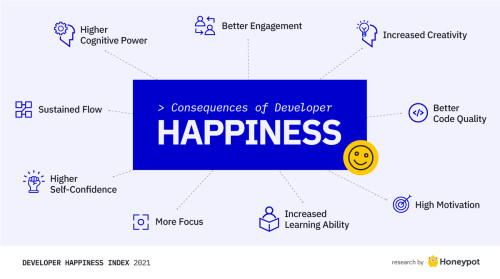What makes software developers happy?
I’ve spent a lot of time thinking about that question over the last five and a half years. Happiness is a fascinating subject; it drives so many of our life outcomes, from health to wealth, and yet, we often don’t understand it, let alone prioritise it.
To give more weight to the topic, we asked 4,000 developers to evaluate their happiness across four key areas: career, quality of life, social freedoms and community.
And so, the Developer Happiness Index was born. Here are just seven of the things I learnt about developer happiness from working on the report.
1. Happiness affects a lot for developers — even their code quality
Believe it or not, developer happiness is an academic field of study, a small niche within the broader study of happiness. Through the work of scholars, we know that happy software developers are more productive, write better code and make better decisions.
What's more, happiness positively impacts developers’ sense of self — increased motivation and accomplishment, higher creativity, engagement and self-confidence are all results reported from greater happiness. By contrast, unhappiness causes low cognitive performance, mental unease or disorder, low motivation, work withdrawal and broken flow.
Our results found that developers, on average, self-evaluated their happiness at 61 points out of a potential 100, 4 points less than the average OECD citizen. Hard to say if the comparison is fair, given the different data sets, but it suggests developers are not yet prioritising their happiness.

2. Unemployment is destructive to people’s wellbeing
Since we spend a great deal of our lives working, it is inevitable that work plays a key role in shaping our levels of happiness. It can make us happy or unhappy and our happiness impacts our performance.
What is perhaps less appreciated is that unemployment itself is destructive to people’s wellbeing. This is one of the most robust findings in the study of happiness — it is true across age, gender, and location, according to the World Happiness Report.
Employed people are happier and have less negative emotional experiences in their day to day lives. Further, non-monetary aspects of employment, such as social status, social relations, daily structure and goal achievement, are key drivers of happiness.
3. Developers in Northern Europe are the happiest in the world
We found that developers in Northern Europe are the happiest in the world. Nordic countries dominate the rankings: Denmark, Norway, Finland and Sweden are all in the top ten. Canada ranks joint 8th with Germany and is the only non-European among the top.
Given our sample’s limitations, we compared the findings to the World Happiness Report 2020 (WHR) to check for integrity. Our results are fairly consistent with the report — seven of the top 10 countries are shared across both sets of data. Germany, Canada and France, which rank 8th, 9th and 10th in our results, appear 17th, 11th and 23rd respectively on the World Happiness Report. The dominance of the Nordics in both reports is a striking similarity.
The World Happiness Report attributes the Nordic populations’ happiness to “the quality of institutions, such as reliable and extensive welfare benefits, low corruption, and well-functioning democracy and state institutions.” Indeed, sustained happiness is connected to a high perceived level of stability and democracy.
Relationships and personal autonomy are also important factors moderating happiness. According to the WHR, “Nordic citizens experience a high sense of autonomy and freedom, as well as high levels of social trust towards each other, which play an important role in determining life satisfaction.”
Stability and well-functioning institutions combined with personal freedom, safety and autonomy seem to be the recipe that determines happiness in the countries that top both our index and the WHR.
4. Work-life balance matters most for developer happiness
Across all 20 happiness indicators, work-life balance is the most important predictor of developer happiness. Work-life balance for developers is not simply about shorter working hours — though that does help.
Northern European developers, who work the shortest hours, are also the happiest. However, Western Europeans and North Americans, who are second and third most happy respectively, work longer hours — significantly longer in the case of Americans.
Trust and flexibility are significant contributors to a developer’s happiness with work-life balance. Northern European cultures excel in collaboration, consensus-based decision-making and strong trust between colleagues.
Trust and flexibility are significant contributors to a developer’s happiness with work-life balance.
To maintain happy developers, we found it is essential to not only promote a healthy work-life balance but to live it. Employers should train and encourage supervisors to be positive role models and offer practical and emotional support in work-life balance topics.
5. Team, management and recognition are keys to happy workplaces
Given the collaborative nature of software development, it’s no surprise that developers care deeply about the team they’re on. When describing happy work environments, team, management and recognition were the factors that matter most to developer happiness.
Developers say they want to be part of “passionate,” “diverse,” “cooperative,” and “supportive” teams. They expect responsibility to be shared, team members to be open to knowledge-sharing and product colleagues to be process-driven and focused.
Engineering’s relationship with Product can fuel productive, creative solutions, or developers can see it as a major obstacle in building stable and valuable products. Collective responsibility and high trust – not just amongst engineers, but among the broader team – is desired by many:
“I value respect among co-workers and owning up to failure as a team rather than pointing towards a specific person or department. For example, not blaming just the QA team for a site-breaking bug making its way to production since multiple failures by multiple parties need to occur for this to happen.”
Management and recognition were also sticking points for developers in our survey. Developers state that they would “rather work for a good manager but use a bad tech stack” than vice versa; “poor management can make people change jobs or give up altogether,” and “the pay is decent, the tech stack is lacking, but my manager does not inspire or promote progress, so I am leaving.”
6. Female developers are happier than male developers — but they still get paid less
Female developers are happier than male developers overall. They are also more satisfied than male developers with their salaries, although they are paid significantly less than their male counterparts.
We found evidence of the gender pay gap in all territories for which we had sufficient data. The largest pay gaps are in North and South America, where the difference between male and female developers’ pay is 21% and 35%, respectively.
7. Ageism in tech starts at 29 and the older developers get, the less happy they are
The older a developer is, the less happy they tend to be, particularly in factors related to working environment and company culture.
Perhaps not surprising since much of tech company culture is built around younger groups. According to research, the average age that tech professionals begin experiencing ageism is 29 years old, compared to 41 years old on average across industries.
Developer Happiness Index 2021
Well-being operates in a self-reinforcing positive feedback loop — happiness in one area of your life drives and impacts your happiness in others.
To understand more about developer happiness, check out our Developer Happiness Index, available now on .cult by Honeypot.
If you are a developer who wants to get happier with a new job, then sign up to Honeypot, Europe’s developer-focused job platform.


